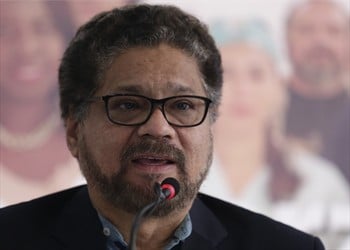A recent meeting in Venezuela between the leaders of two Colombian guerrilla groups may signal that these groups have solidified their criminal activities in Venezuela, where it is easier for them to operate and evade authorities.
On December 3, media outlet La Silla Vacía reported that a meeting was held in October between top leaders from the National Liberation Army (Ejército de Liberación Nacional – ELN) and dissidents from the Revolutionary Armed Forces of Colombia (Fuerzas Armadas Revolucionarias de Colombia – FARC). Some sources also allegedly told La Silla Vacía that members of the Common Alternative Revolutionary Force (Fuerza Alternativa Revolucionaria del Común – FARC) political party were also present.
The meeting was held in the Venezuelan border state of Apure to solidify agreements between FARC dissidents and the ELN.
According to La Silla Vacía, the two groups “are coordinating their activities to move the dissidents’ cocaine along ELN-controlled routes on the border between Venezuela and Colombia’s Arauca department. Furthermore, after more than five years of war between the FARC and the ELN in the same department, they have now struck a non-aggression pact.”
SEE ALSO: FARC in Venezuela
El Colombiano reported on the possible alliance as well.
“We know that there is a partnership between the ELN and the (FARC) dissidents and that they are coordinating their illicit actions such as extortion and smuggling. And they’re sharing the money because they want to profit from both,” General Álvaro Vicente Pérez, Commander of the Colombian army’s Quirón Task Force, told the newspaper.
While none of the October meeting’s attendees could be verified, La Silla Vacía reported that three members of the FARC political party’s leadership may have been there: Nelson Enrique Díaz Osorio, alias “Iván Alí”; Henry Castellanos Garzón, alias “Romaña”; and José Manuel Sierra Sandoval, alias “Aldinever Morantes.”
InSight Crime Analysis
A potential alliance between FARC dissidents and the ELN has serious implications for both Venezuela and Colombia. Two consequences, in particular, could be dire for both countries: the increase in organized crime activities in Venezuelan territory and delivering a body blow to Colombia’s peace agreement with the FARC.
The criminal economies that the dissidents and the ELN have brought to Venezuela have become lifelines for many hungry and desperate Venezuelans facing their country’s worsening economic crisis. These economies, however, also serve President Nicolás Maduro, who has provided the groups with support in states such as Apure, Amazonas, and Bolívar, now considered to be criminal enclaves.
InSight Crime confirmed with sources in Colombia’s security forces and local sources in Arauca department that the meeting between ELN members and FARC dissidents did indeed take place. Demobilized FARC leaders, including Luciano Marín, alias “Iván Márquez,” and Hernán Darío Velásquez, alias “El Paisa,” are believed to have participated in the meeting.
The supposed participation of former guerrilla leaders who played key roles in a historic peace agreement may be a sign that they are taking up arms again and returning to their criminal activities. If so, it could severely endanger the peace process with the government.
Meanwhile, the presence of ELN head Gustavo Aníbal Giraldo, alias “Pablito” — who has an Interpol red notice issued against him and may be hiding out in Venezuela — could not be confirmed. But he seems to have given his blessing to the meeting.
SEE ALSO: ELN Now Present in Half of Venezuela
The possibility of a peace agreement between the ELN and the Colombian government had already diminished this past year, and the arrival of President Iván Duque seems to have clinched its demise. The group’s current situation means it has every reason to take refuge in Venezuela, where it can take advantage of support from the Maduro administration and some members of the national guard.
Now, the ELN and FARC dissidents appear to have have put their old differences behind them with their latest meeting. Though the FARC underestimated the ELN in the past, the FARC’s dissidents likely view the rebel group as a strategic ally. The criminal power the ELN has built in Venezuela, where they have a presence in at least 12 states that InSight Crime could verify, has given the guerrilla group significant leverage.
In some areas, the two groups are already working together. If the alliance continues to strengthen, the threat from these groups could spread beyond Venezuela and Colombia, and pose a more severe regional danger.

